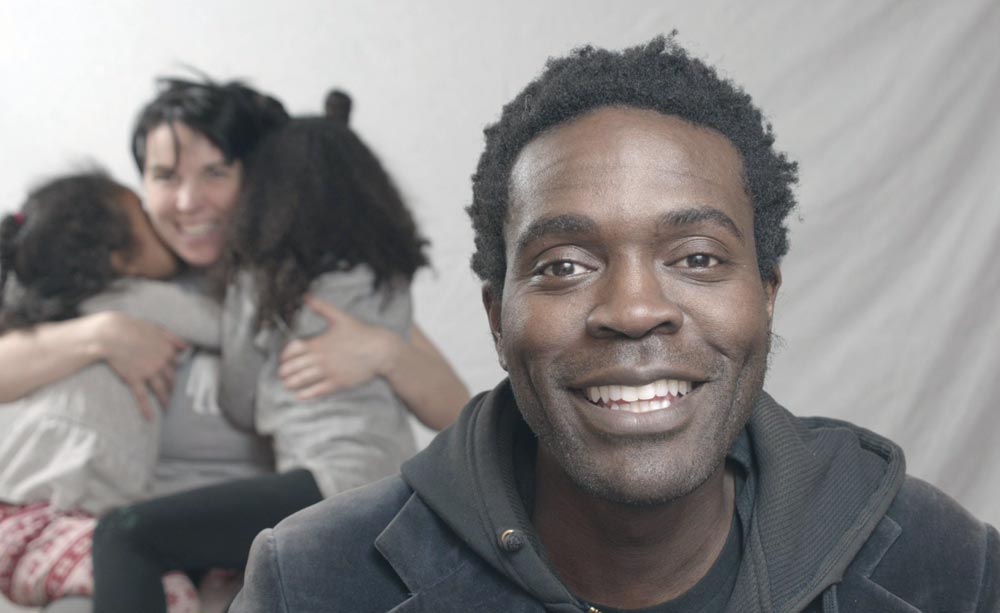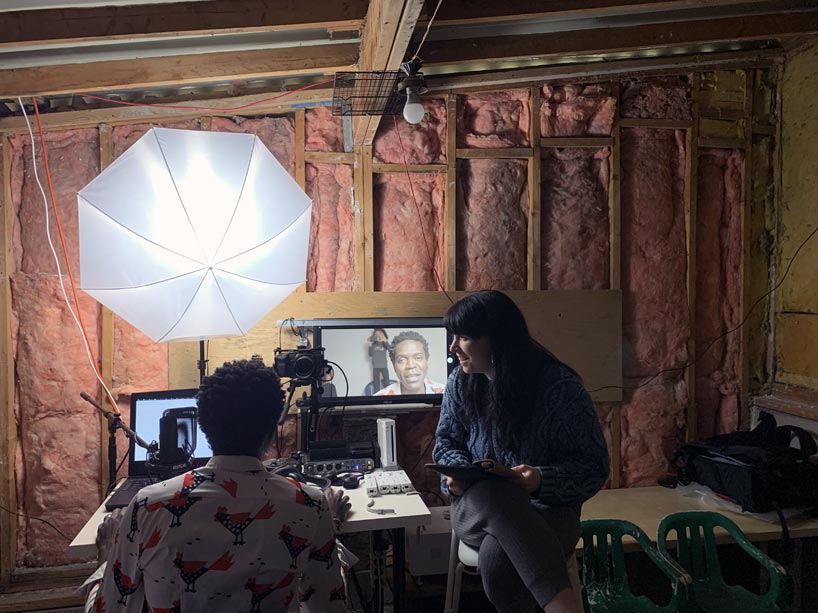Ryerson professor launches YouTube series for parents as video games surge in pandemic

Ryerson professor Kristopher Alexander, front, and his family, back left, pose in the studio where he films his recently launched YouTube series, It’s a Parent. (Photo: Kristopher Alexander).
When video games expert and Ryerson professor Kristopher Alexander goes to film a new episode of his recently launched YouTube series, It’s a Parent (external link) , he puts on his shoes, grabs his coat and heads to his backyard shed.
“I get curious looks from neighbours sometimes,” he laughed. “But, my wife and I have two kids, and I needed a place where I could think and create. So, I thought, ‘Why not build a studio in the shed?’”
While the studio – which he’s nicknamed The Citadel – is far from completion – he’s grateful to have a space to focus. Lately, Alexander’s expertise in video game design, broadcasting and esports infrastructure has been in high demand.
Why? When the global pandemic hit, it sent millions of people inside – and many turned, and returned, to one of the few worlds still accessible – video games.
With screen time soaring among kids and teens, video game use at an all-time high and esports seeing a massive surge, suddenly, everyone from parents and media to business and tech giants had burning questions that the Ryerson professor was uniquely poised to answer.
“All of a sudden, people had all these questions about things that I’ve been trying to talk about for years,” said Alexander, who teaches in Ryerson’s RTA School of Media at FCAD (Faculty of Communication and Design). “Even CNN was asking me about it (external link) .”
Launching It’s a Parent
As questions arose, it became clear to Alexander that parents needed to be more equipped.
That’s when his wife, Naomi Alexander, suggested he launch a YouTube series to help educate parents about video games. It’s a Parent launched on May 3.
In each episode, Alexander has five questions to answer about kids and video games – and for each question, he has only 30 seconds to respond.
“I hope to inspire parents and give them the tools to be able to evaluate what they're giving to their kids digitally,” Alexander said.
Despite the occasional leak in the ceiling (he once held a lighting umbrella over his head during a Zoom call) and cat fight on the roof, Alexander has produced three episodes of the series, and he’s eager to create more.
“There are a lot of things parents are afraid to ask or that they’re just not familiar with,” Alexander said, noting he’s already received questions from as far as France and Switzerland.

Ryerson professor Kristopher Alexander in front of the backyard shed where he’s producing a YouTube series, video games and more. (Photo: Kristopher Alexander).
To illustrate, he said some parents worry if their child only wants to play the shooter in violent games, or whether their son or daughter is safe interacting with other users.
Topics on the show have so far included: free games, esports, coding, French-language games, girl empowerment, games to avoid and online safety.
He says one of the positives of parents being stuck at home with their kids is that some are realizing the misconceptions they’ve had about video games.
‘Woah, I didn’t know games could do that’
“I’ve had parents say to me, ‘Oh you probably let your kids play video games all the time,’” and I’ll say, ‘No, absolutely not,’” he said.
“Then when I would say what games we’re playing, they’d say ‘Woah, I didn't know games could do that,’” he said, noting that he often plays Ring Fit Adventure – which is based on physical activity – with his wife and daughters.
“Sometimes I’ll do extra bicep squeezes with the ring-con to earn points that I can give my kids as their digital allowance,” he said, referring to using a large resistance ring that comes with the game to track a player’s movement.
“When a lot of parents think of video games, they think of violence – but just like books have many different genres, so do video games,” he said.
“In Prodigy, for example, the math and problem-solving skills in that game are incredible. And, if your child is sad or uncomfortable in social situations, there are games they can play that can help them,” he said.

It’s a Parent is produced by Ryerson professor Kristopher Alexander and his wife, Naomi Alexander, pictured above. They film each episode before their kids get up in the morning. (Photo: Kristopher Alexander).
‘This world is going to explode’
Alexander also says that while the pandemic has put video games in an even bigger spotlight, it’s a trend that has been brewing for some time – and is here to stay.
“I remember, when I was teaching my first video game design course, they had to send emails out saying, ‘If you’re not in the class, don’t come’ because students who weren’t registered were coming and sitting on the stairs and in the back. Nobody had seen a class like it,” he said, also crediting professor Richard Lachman, director of FCAD’s Transmedia Zone, for giving him the green light on the cutting-edge course.
“I know this world is going to explode… Video games are a vehicle to teach reading and writing, mathematics, collaboration, team skills and life skills,” he said. “It’s the present, and the future.”
Submit a question to It’s a Parent (external link) .
Related:





